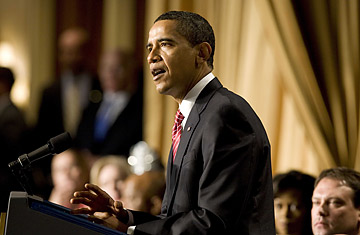
President Obama speaks at the National Prayer Breakfast in Washington
(2 of 2)
That hiring question is the first landmine Obama will face. In Zanesville, he left no question as to where he stood on the issue. "If you get a federal grant," Obama said then, "you can't use that grant money to proselytize to the people you help, and you can't discriminate against them — or against the people you hire — on the basis of their religion."
The statement caused an immediate uproar within the ranks of Obama's religious supporters, who pushed him to back off from the promise to undo Bush's Executive Order. He has not done so publicly, but several of them insist that Obama and his aides have given them private assurances that there will be no rapid movement to change the status quo with regard to religious hiring. If so, it would be a rare case of political ham-handness by the Obama team, because his secular supporters say they have been assured that the hiring change will take place.
"I have not heard from anybody to suggest that the President is moving away from the commitment he made in Zanesville to clean up the constitutional problems with the faith-based initiative," says Barry Lynn of Americans United for the Separation of Church and State. "Other people claim he's moving. But that's not what I'm hearing."
Another of Obama's Zanesville promises will pose an enormous bureaucratic challenge to his faith-based operation. "We will also ensure that taxpayer dollars only go to those programs that actually work," he vowed in July. It was a pledge Bush made as well in the early days of the faith-based initiative, insisting that "results" would be the only criterion by which programs were judged. But measuring the effectiveness of programs that receive government money turns out to be a monumental task, and the Bush Administration never did implement a widespread assessment program. In the current economic climate, the pressure to direct taxpayer money to only those programs that actually achieve the desired results will be even greater. But it is still unclear whether DuBois and his staff will be given the resources to carry through on their boss's pledge.
They may not have to. One of the reasons to create a Presidential Advisory Council is to give its members the job of dealing with thorny issues and coming to consensus. If they can't arrive at a workable solution — whether on hiring questions or an abortion-reduction policy — it probably can't be done. If they do, there's a good chance that most of the communities they represent will buy into the policy recommendations that result.
The Council's potential to solve problems for Obama makes it all the more surprising that its members haven't been thoroughly vetted in the rush to publicly introduce them. Calls were still going out to invited council members as late as Tuesday night. Given that vetting snafus have already tripped up some of Obama's other appointments, most notably Tom Daschle, supporters are hoping that the President doesn't get burned by another religious leader who has made controversial statements à la Jeremiah Wright or Warren.
